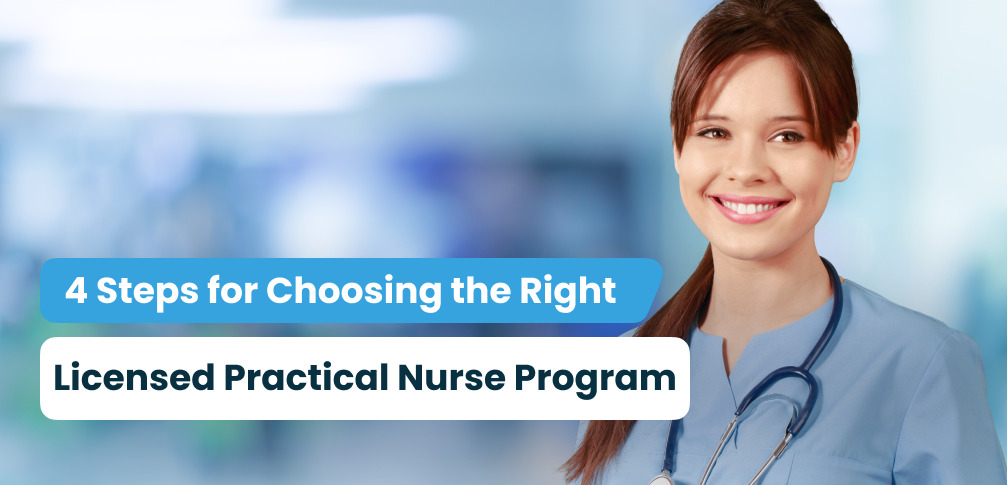
Congratulations on your decision to become a licensed practical nurse! Now comes the decision on which school to attend to pursue your diploma. Thankfully, you have several choices available and are sure to find the LPN program that works best for you. Here are the four steps to follow when making this important decision.
There is always a need for LPNs to assist medical staff in caring for patients. This job puts you on the front lines of healthcare and makes you a key player in the wellness of the patients you serve.
Achieving your LPN diploma is often the first step of a nursing career. Many students continue their studies to become registered nurses or nurse practitioners. If furthering your education is your goal, select a college or nursing university that offers additional career tracks.
Your next step is to determine how much you can afford to pay for your studies. There is a wide range of tuition costs between schools. Community colleges and medical trade schools tend to be the most affordable, while private nursing schools and universities have the highest fees.
Being able to handle the cost yourself keeps you from having loans to pay off later. If you have money saved up, look first at the schools offering tuition you can afford. An online school or night classes enable you to earn your diploma while working full-time to pay for your education. If you are already employed in the medical field, see if your company offers tuition assistance.
If your savings don’t cover it, check with the schools you are seriously considering to see if they offer financial aid, grants, or scholarships. If not, see if they provide part-time jobs with some of their medical partners.
The U.S. government also offers financial assistance, including loans through participating nursing schools that are paid back after graduation. You can also look into student loans through banks, credit unions, and other financial institutions.
Today’s nursing schools offer you three ways to pursue your certification: online, on-campus, or a hybrid combination of the two. All offer the advantage of pursuing your certification full-time in 11 months or part-time in 22 months. Here’s a look at the benefits of each of the three:
Enhanced technology makes it possible to achieve your training entirely online. Beyond 3D images and online tutorials, live-streaming lets you ask your professor questions or complete a team project with other students. In addition, simulation labs put you in different scenarios to train you how to approach the problem and take the necessary action.
An online LPN program allows you the flexibility to attend school on your timetable. This helps you juggle your studies with other responsibilities, such as a job or a family. Choosing online courses also allows you to select a school anywhere in the United States instead of one within driving distance.
If you are an older student, you may prefer the online environment over being in a classroom with much younger students. Don’t let the technology aspect hold you back, as you can receive plenty of assistance in learning how to use the learning tools.
If you are looking for the traditional college experience, an on-campus LPN program is the best choice for you. However, it limits your options to local schools unless you are willing to move to another location.
The discipline of attending class every day keeps you motivated to complete your coursework. Another advantage is in-person labs and simulations, which are especially helpful if you are a hands-on learner. Finally, the on-campus experience makes it easier for you to network with fellow students and faculty who can help you find a job later.
Many nursing schools combine the advantages of online learning and on-campus classes with a hybrid format. Often your basic courses are covered online, and the labs and simulations are held on campus. In addition, many nursing schools offer accelerated hybrid programs to enable you to earn your LPN diploma in as little as six months.
There are many factors to consider when selecting your LPN school. A helpful place to start is an online search for recommended schools. Then, narrow down your choices. Only consider places that:
Visit the website of the school you are most interested in to get more information about the courses being offered. Go to its Facebook page to see what current and former students say about the school. Then, reach out to any alumni to see if they’d be willing to answer your questions about the LPN program.
If you’re planning on attending an on-campus school, schedule a tour of the facilities and ask if you can attend one of the classes. Watch to see if the instructors speak professionally and knowledgeably and if the faculty feel relatable to you. Then, as you walk through the building, determine if you get a feeling of a warm, caring environment or a cold and sterile one. You want to be in a place where you can learn and develop your skills in a supportive atmosphere taught by professional faculty.
Following these four steps helps you discover the right LPN program for you and your needs. They help you narrow down your choices and ask the right questions to ensure you select a school that will provide the education you need to succeed.
At Academia Labs, we are committed to giving you the information you need about educational institutions for nursing and other scientific fields. We also updated the list of the best online LPN programs in the United States.
© 2024 AcademiaLabs | All Rights Reserved